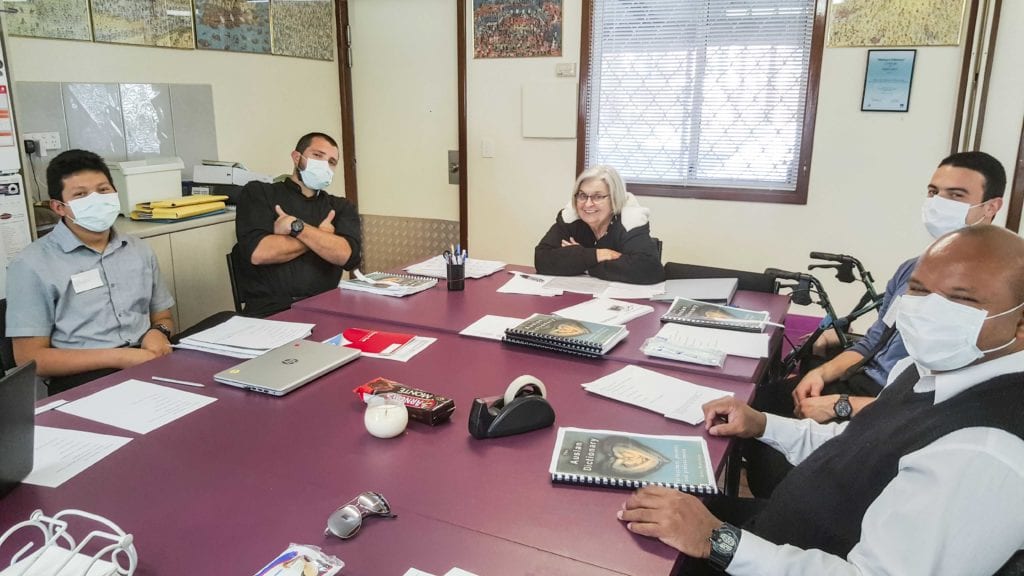
“Could you image experiencing the COVID-19 lockdown without being able to ask anyone what was happening, or find out why you can’t buy the things that you need to, or access the services that are part of your daily life?” Emmanuel Centre Coordinator Barbara Harris challenged her class on Monday afternoon.
The answer to that question – being confused and afraid – is what brings her students, some 10 seminarians of Redemptoris Mater Seminary from around the world to study AUSLAN – the official sign language in Australia – as a way of extending the love and compassion that enlivens the Church to the members of WA’s deaf community.
“I’m here because I’ve experienced that God loves me as I am and if I can bring this message to everyone… I can speak English, I can speak Italian – I would love to use sign language as well so that I can share my experience with them and let them know that God loves them,” shared 25-year-old Gionata Pagani.
“It’s about outreach to those who might otherwise be left behind – we’ve learned that the impact of profound deafness is often loneliness and isolation, not being able to communicate with other people. A feeling of exclusion.”
Gionata and his fellow seminarians, who are all based in Morley, have answered the call to live a life dedicated in service to God and for them, the opportunity to broaden their communication abilities was a natural act of compassion.
“I’ve found it very eye-opening so far: I kind of understand now just how difficult it is for deaf people to communicate, how different that is to the way we [hearing people] can communicate and how we so often take it for granted,” explained Matthew Romero, who originally hails from Melbourne.
“I’m keen to become proficient enough to communicate with deaf people who aren’t able to audibly hear anything.”
“I’m also interested to see just how far you can take the idea of interpretation of a text, in terms of translating or interpretation of what someone’s saying and exactly how you can translate that in different ways – just how far can you take it for someone to understand, would you understand the same thing? Does it stay coherent?”
Daniel Kwaudi, who hails from Papua New Guinea, is the oldest of the group and admits that he struggled with communication, especially during his first year in Australia, but that this experience has served as an effective catalyst for learning sign language.
“I hope to learn AUSLAN to be able to communicate effectively with more people,” Daniel told The Record.
“At the seminary we have Italian speakers, Spanish speakers, and English speakers.
“I struggle to communicate – but I find that with sign language, I don’t have to speak the language or the grammar, yet I can still communicate. So it can be anyone, with a hearing impairment or not and I can communicate freely with sign language.”
Similarly, Columbians Jose and Sebastian have found that the course has useful insights and applications for someone who has had to learn English after coming to Australia, especially when dealing with the frustration of not being understood by others.
“Not being able to be understood is an issue the deaf face every day,” Jose explained.
“There is so much more that you have to deal with, so many little things that we would take for granted are made so much more difficult because of it.”
With the exception of Sebastian (who studied sign language at home in Columbia), the experience of learning AUSLAN was, just as it is for many Australians, completely unexpected – even though the ability to sign is arguably a necessary skill in modern society, it is a form of expression often overlooked.
Raising awareness of the necessity to include AUSLAN training and translation in communications is often the first half of the battle for advocates of the deaf and hard of hearing community.
“It’s not something that I ever thought about until the opportunity was offered to me, but I’m so glad that I did, and it’s been fun learning as well,” Gionata shared.
“I think what people are unaware of is the gratitude that deaf people have for people who can speak sign language, I think if you can increase the pool of people who can speak sign language, who can communicate with them… seeing how valuable that would be should spur a lot of people on to learn AUSLAN, to make that heart change.”
“On the flip-side of the frustration, when someone makes the effort to actually make themselves understood, such as to go to the effort of learning sign language, then that is something that deaf people would really appreciate,” Michael elaborated.
“Given the isolation and inability to access information that came with COVID-19, I think that having someone there who can understand is something that they would appreciate even more.”